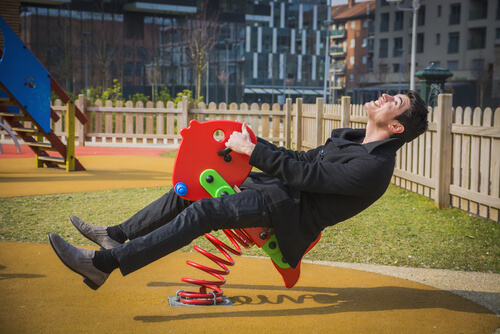The Infantilization of Society: Why Adults Act Like Children


Written and verified by the psychologist Cristina Roda Rivera
Infantilization means treating adults like children. Whoever does it creates a cycle of dependency in which the adult constantly needs to be told what to do and how. The infantilization of society consists of treating adults like children. It promotes increasingly childish attitudes and ways of life that aren’t associated with adulthood.
Today, being young is no longer a biological transitional stage, but rather a life choice. This is something that’s well-established and brutally promoted by the media. In fact, today’s unmotivated adult is neither a sweatshop worker nor an exhausted housewife.
They’re a new type of pseudo-adult. They’re perpetually offended and despise the ignorance of those who don’t understand them. In effect, they’re big kids, who’ve moved from being protected by their parents to being justified and pampered by an infantilized society.

The infantilization of society
Research conducted by Nathan Winner (2019) of the University of Southern Mississippi (USA) explored the role of overparenting, popularly known as helicopter parenting, and its influences on youth.
In today’s society, over-parenting has spread to a series of institutions, advertising, public opinions, and the media. It replaces parents who exempt their children from responsibility and discipline, effectively taking over from them.
If an ideal of maturity persists, it finds no satisfactory compensation in today’s society. In fact, the effect of this infantilization of society is noticeable in several spheres.
It ranges from the election of leaders with rampant narcissism to the assumption of the role of the victim. A role that blurs true injustices. Also, public communication full of sensationalism is established, where there’s little room for moderation or good sense.
The media takes over from parents and the precariousness of work justifies it
The media, markets, and advertising play a fundamental role in the transformation of vital stages. Newscasts give increasingly more space to broadcasting news of morbid crimes.
The language of politics has been dogmatized and has become a mere baseless imposture. The typically complex adult morals have been lost.
TV is full of reality shows that contain not an ounce of reflection. Furthermore, the increasing use of rejuvenating creams, botox injections, and sex drugs represents further evidence of a conscious and widespread escape from our true biological ages.
Included in this way of life, is the current way parents deal with their children. In fact, the responsibility seems to have passed to grandparents, teachers, and institutions. The continuous and mercantilist exposure of children to social media reflects the most perverse part of this infantilized parenting.
The infantilization of society produces a rejection of adulthood
The liberal, liquid, individualistic, and presentist connotations that shaped postmodernity seem to have gradually led to a true psychological rejection of the condition of adulthood. There’s a freedom that authorizes any and every possibility, but this also brings frustration and anxiety because everyone knows that they’ll never be able to try everything.
This worries adults. They escape psychologically from their own condition by taking refuge in the world of the young where the possibilities are increasingly wider. In fact, youth seems to be the most effective model for living in society today.
The difference with pre-industrial times
In pre-industrial societies, at birth, we entered into an organizational structure that wasn’t seen as a result of cultural evolution, but as constant and unchanging as nature itself. This guaranteed our social affiliation upon reaching maturity.
In those days, society provided us with life projects and we had to prove to ourselves that we could carry them out and foster lasting bonds as much as possible. Later, industrialization changed this picture. However, there’s no longer a consolidated stratification. We’ve discovered the unprecedented opportunity to draw our own ‘social selves’.
This turned out to be a fascinating and liberating context. Nevertheless, over the years, it’s transitioned into a feeling of ‘exhausting freedom’.

A free but terrified generation
Today, everything seems possible but, at the same time, too risky. Vagueness, the unknown, and insecurity lurk behind every potential decision. A generation of parents who’ve given their children everything has produced a generation of adults who prefer not to fully mature in the face of challenges that are too demanding and risky for them.
Therefore, they’ve chosen to avoid uncertainty. Consequently, they make mistakes. Their decisions always seem to be reversible and temporary at work, training, and relational levels. Furthermore, the work context sometimes isn’t helpful, which presents added difficulties.
As a result, the young adult seeks immediate satisfaction, denying the future and living in a perennial and indefinite present. To them, it seems like a more compelling proposition and a concrete possibility.
In Freudian terms, it’s the pleasure principle today that dominates the reality principle. Youth has become the only real existential proposal.
As a matter of fact, youth, like beauty, success, and money, has become an object that apparently can be possessed forever. In other words: youth, which is a biological condition, seems to have become a cultural definition. In effect, we’re young not because we’re a certain age, but because we have the right to enjoy certain lifestyles and ways of consumption.
Presentism and pseudo-adulthood
Presentism is a forced choice in the individual who doesn’t want to face uncertainty. In a globalized and presentist society, the here and now have become of maximum importance.
However, an excessive or poorly balanced presentist approach cancels the future and any projects and long-term commitments. These are the kinds of attitudes that used to be indicators for the social recognition of the adult, of maturity. Nowadays, a vision of an unstable and irresponsible pseudo-adulthood is formed.
As contemporary adults, we may therefore choose to wear a mask and live without a concrete sense of time. We’re individuals who aren’t yet complete but in process. Whether we want to or not, whether we’re aware of it or not, we continue to potentially hold a plurality of options, choices, and existential promises. This scares, confuses, and fascinates us because the expectation of a dream has more charm than its realization.
The good and the bad of the infantilization of society
Like all advances in society, acquiring new freedoms entails a process of assimilation and stabilization within groups. Today, resuming activities classified for children in adult life (such as video games) is seen as perfectly valid, as long as it’s not linked to the avoidance of responsibility toward ourselves.
The childish isn’t only synonymous with the denial of self-sufficiency but is a refuge for everything threatening in our lives. The bombardment of consumer obligations, labor exploitation, and social pressure means we want to immerse ourselves in the kinds of activities typical of a time when everything was so much simpler. In fact, this childish refuge is the bastion of tranquility that many people need to guarantee their emotional health.
Infantilization means treating adults like children. Whoever does it creates a cycle of dependency in which the adult constantly needs to be told what to do and how. The infantilization of society consists of treating adults like children. It promotes increasingly childish attitudes and ways of life that aren’t associated with adulthood.
Today, being young is no longer a biological transitional stage, but rather a life choice. This is something that’s well-established and brutally promoted by the media. In fact, today’s unmotivated adult is neither a sweatshop worker nor an exhausted housewife.
They’re a new type of pseudo-adult. They’re perpetually offended and despise the ignorance of those who don’t understand them. In effect, they’re big kids, who’ve moved from being protected by their parents to being justified and pampered by an infantilized society.

The infantilization of society
Research conducted by Nathan Winner (2019) of the University of Southern Mississippi (USA) explored the role of overparenting, popularly known as helicopter parenting, and its influences on youth.
In today’s society, over-parenting has spread to a series of institutions, advertising, public opinions, and the media. It replaces parents who exempt their children from responsibility and discipline, effectively taking over from them.
If an ideal of maturity persists, it finds no satisfactory compensation in today’s society. In fact, the effect of this infantilization of society is noticeable in several spheres.
It ranges from the election of leaders with rampant narcissism to the assumption of the role of the victim. A role that blurs true injustices. Also, public communication full of sensationalism is established, where there’s little room for moderation or good sense.
The media takes over from parents and the precariousness of work justifies it
The media, markets, and advertising play a fundamental role in the transformation of vital stages. Newscasts give increasingly more space to broadcasting news of morbid crimes.
The language of politics has been dogmatized and has become a mere baseless imposture. The typically complex adult morals have been lost.
TV is full of reality shows that contain not an ounce of reflection. Furthermore, the increasing use of rejuvenating creams, botox injections, and sex drugs represents further evidence of a conscious and widespread escape from our true biological ages.
Included in this way of life, is the current way parents deal with their children. In fact, the responsibility seems to have passed to grandparents, teachers, and institutions. The continuous and mercantilist exposure of children to social media reflects the most perverse part of this infantilized parenting.
The infantilization of society produces a rejection of adulthood
The liberal, liquid, individualistic, and presentist connotations that shaped postmodernity seem to have gradually led to a true psychological rejection of the condition of adulthood. There’s a freedom that authorizes any and every possibility, but this also brings frustration and anxiety because everyone knows that they’ll never be able to try everything.
This worries adults. They escape psychologically from their own condition by taking refuge in the world of the young where the possibilities are increasingly wider. In fact, youth seems to be the most effective model for living in society today.
The difference with pre-industrial times
In pre-industrial societies, at birth, we entered into an organizational structure that wasn’t seen as a result of cultural evolution, but as constant and unchanging as nature itself. This guaranteed our social affiliation upon reaching maturity.
In those days, society provided us with life projects and we had to prove to ourselves that we could carry them out and foster lasting bonds as much as possible. Later, industrialization changed this picture. However, there’s no longer a consolidated stratification. We’ve discovered the unprecedented opportunity to draw our own ‘social selves’.
This turned out to be a fascinating and liberating context. Nevertheless, over the years, it’s transitioned into a feeling of ‘exhausting freedom’.

A free but terrified generation
Today, everything seems possible but, at the same time, too risky. Vagueness, the unknown, and insecurity lurk behind every potential decision. A generation of parents who’ve given their children everything has produced a generation of adults who prefer not to fully mature in the face of challenges that are too demanding and risky for them.
Therefore, they’ve chosen to avoid uncertainty. Consequently, they make mistakes. Their decisions always seem to be reversible and temporary at work, training, and relational levels. Furthermore, the work context sometimes isn’t helpful, which presents added difficulties.
As a result, the young adult seeks immediate satisfaction, denying the future and living in a perennial and indefinite present. To them, it seems like a more compelling proposition and a concrete possibility.
In Freudian terms, it’s the pleasure principle today that dominates the reality principle. Youth has become the only real existential proposal.
As a matter of fact, youth, like beauty, success, and money, has become an object that apparently can be possessed forever. In other words: youth, which is a biological condition, seems to have become a cultural definition. In effect, we’re young not because we’re a certain age, but because we have the right to enjoy certain lifestyles and ways of consumption.
Presentism and pseudo-adulthood
Presentism is a forced choice in the individual who doesn’t want to face uncertainty. In a globalized and presentist society, the here and now have become of maximum importance.
However, an excessive or poorly balanced presentist approach cancels the future and any projects and long-term commitments. These are the kinds of attitudes that used to be indicators for the social recognition of the adult, of maturity. Nowadays, a vision of an unstable and irresponsible pseudo-adulthood is formed.
As contemporary adults, we may therefore choose to wear a mask and live without a concrete sense of time. We’re individuals who aren’t yet complete but in process. Whether we want to or not, whether we’re aware of it or not, we continue to potentially hold a plurality of options, choices, and existential promises. This scares, confuses, and fascinates us because the expectation of a dream has more charm than its realization.
The good and the bad of the infantilization of society
Like all advances in society, acquiring new freedoms entails a process of assimilation and stabilization within groups. Today, resuming activities classified for children in adult life (such as video games) is seen as perfectly valid, as long as it’s not linked to the avoidance of responsibility toward ourselves.
The childish isn’t only synonymous with the denial of self-sufficiency but is a refuge for everything threatening in our lives. The bombardment of consumer obligations, labor exploitation, and social pressure means we want to immerse ourselves in the kinds of activities typical of a time when everything was so much simpler. In fact, this childish refuge is the bastion of tranquility that many people need to guarantee their emotional health.
All cited sources were thoroughly reviewed by our team to ensure their quality, reliability, currency, and validity. The bibliography of this article was considered reliable and of academic or scientific accuracy.
- Orbe-Nájera, C., & Tipán-Meza, C. (2019). Infantilización en estudiantes universitarios:¿ un sistema que privilegia la dependencia?. CienciAmérica, 8(2), 137-151.
- Gaviria, J. A. Q., & Muñoz, J. D. C. (2011). De la seguridad democrática, el miedo, la confianza básica y una democracia heterónoma e infantilizada. Eleuthera, 5, 206-228.
This text is provided for informational purposes only and does not replace consultation with a professional. If in doubt, consult your specialist.







